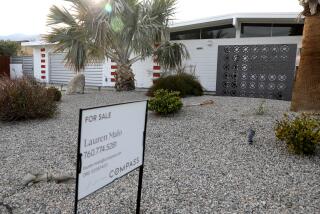THE ADVICE IS IN THE MAIL : Newsletters: Small real estate investors get high-powered advice on everything from making deals to the latest tax-saving hints.
- Share via
Small investors generally don’t have direct access to the Donald Trumps of the world or the expensive, high-powered strategists who know the ins and outs of real estate investing.
But that doesn’t mean they can’t get good information from experts. There are a number of relatively inexpensive newsletters around the country that cater to small real estate investors.
These publications provide helpful knowledge on everything from finding and making deals to creative financing techniques to the latest tax-saving tips.
The best include a half dozen or so written by veteran, hands-on real estate investors who share their insights and experience. A couple of the newsletters are adjuncts to the authors’ seminar business.
The tip sheets are published monthly and generally run eight pages. The cost for a one-year subscription ranges from $35 to $121.
The most noteworthy include:
Real Estate Investor’s Monthly. Publisher John Reed, whose subscribers are fairly sophisticated investors, generally concentrates on at least two principal topics each month. The suburban San Francisco writer, whose investment of choice is large apartment buildings, takes a no-nonsense look beneath the hype of the latest investment wrinkles.
When he finds a good one, he provides a case history detailing how the deal worked, frequently with actual dollar figures. He has written about why investors shouldn’t be frightened of purchasing distressed properties saddled with huge judgment liens and how a foreclosure wizard made $42,000 in two hours.
Not only does he describe what to watch for, he also tells what to watch out for. When he finds flaws in investment strategies, Reed isn’t afraid to speak critically of his investor brethren. He has told subscribers how to differentiate between educational seminars and phony promotional seminars put on by late-night TV gurus and has exposed the pitfalls of one company’s equity-sharing program.
Reed also keeps tabs on the latest legislative activity in Washington and provides timely updates on IRS and other tax-related changes.
Real Estate Investor’s Monthly. $99 annual subscription, 8 pages, P.O. Box 27311, Concord, Calif. 94527 or telephone 1-800-635-5425.
Real Estate Newsletter. Author and newspaper columnist Robert J. Bruss writes for the homeowners as well as the mom-and-pop investors. The concise and clearly written report demystifies real estate and its often arcane byways.
Bruss picks a single topic each month and then provides a nuts-and-bolts over view of how a concept or strategy works. He has advised newcomers on getting started in real estate investing, on tax-deferred exchanges and the IRS and on advance foreclosure acquisition techniques.
Bruss has broad-based knowledge that comes from his background as an active investor--he prefers single-family fixer-uppers in suburban San Francisco--a former real estate sales agent and as an (inactive) attorney.
Many of his newsletter topics are suggested by readers of his nationally syndicated newspaper column on real estate.
Real Estate Newsletter, $35 annual subscription, 8 pages, P.O. Box 4386, Orlando, Fla. 32802 or telephone 1-800-322-3068.
Distressed Property Investor’s Monthly. This publication used to be called “Diamond in the Rough,” which is another way of saying that author Thomas J. Lucier has never met a dirty, run-down property he didn’t like. If there’s one nearby, Lucier will tell you how to buy it, polish it into a diamond, sell it and make a nice profit.
Lucier, who founded the publication three years ago, is an Orlando, Fla., “blue jeans” investor who does between eight to 12 deals a year. Many of his transactions become grist for his newsletter.
He outlines how to find and purchase all kinds of physically or financially distressed properties, including government and bank foreclosures, probates and tax default sales. There are some distressed property opportunities that many investors aren’t aware of: properties that local governments have ordered repaired, vacated or demolished because they violate health or safety codes, for instance.
Distressed Property Investor’s Monthly, published by Real Estate Publications Inc., $48 annual subscription, 8 pages, P.O. Box 20027, Tampa, Fla., 33622 or telephone 1-800-356-2317.
Creative Investment Advisor. Publisher Jane Garvey took over this Chicago-based publication three years ago following the death of her husband, Marc Godfriend. He founded the 7-year-old newsletter to provide information to local investing groups affiliated with real estate lecturers Wade Cook, Al Lowery and Robert Allen. It subsequently evolved into a national publication and has severed ties to the lecturers.
Subscribers range from high school dropouts to Ph.Ds. The sometimes technical newsletter offers new ideas on property management and tenant screening, discount mortgages, buy-sell strategies in hot or slow markets and rolling options.
Each issue also contains odds-and-ends snippets of legislative and legal updates from Washington and interesting tidbits from other parts of the country.
Creative Investment Advisor, $59 a year, P.O. Box 495, Glen Ellyn, Ill., 60138 or (708) 858-4663.
Financial Freedom Report. Mark O. Haroldsen, investor, author and seminar lecturer, founded this monthly magazine 16 years ago. Its audience ranges from novice to intermediate sophisticated investors. The report provides basic information on acquiring property, financial planning, fixers and landlording. The magazine also contains ads for cassette tapes and books marketed by Haroldsen and many other real estate lecturers.
Financial Freedom Report, $48 annually, 72 pages. 2450 Fort Union Blvd., Salt Lake City, Utah, 84121. 1-800-338-9715.
The Paper Source. This publication, founded in 1987 by Bill Mencarow Jr., a former Washington, D.C., congressional public relations officer, is the one favored by paper investors among a half-dozen newsletters devoted to discount mortgages or notes.
The most arcane field of real estate investing is undoubtedly discount mortgages and notes. But the Paper Source is written in easily understandable language, befitting the fact that two-thirds of its subscribers are novice note investors.
Recent topics have included how investors can find property owners who have notes to sell, investing in land notes and why selling to private investors can sometimes mean big trouble.
The Paper Source, $119 annually, 12 pages. Box 275, Aldie, Va., 22001. 1-800-542-2270. Reprinted with permission from the San Francisco Examiner. Copyright 1991 San Francisco Examiner.
More to Read
Inside the business of entertainment
The Wide Shot brings you news, analysis and insights on everything from streaming wars to production — and what it all means for the future.
You may occasionally receive promotional content from the Los Angeles Times.










